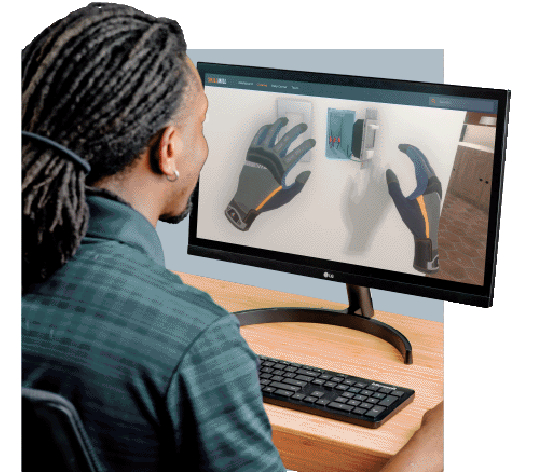- (865) 813-8808
- info@tennesseetradeschool.com
- Mon - Fri : 9:00 am - 5:00 pm
Electrical Technicians are in high demand and receive excellent compensation. Discover your potential with our comprehensive training programs.
Learn faster and more effectively. Accelerate your path to becoming a job-ready Electrician Apprentice with advanced virtual reality training that simulates real-world scenarios and hands-on skills.



Electricians play a critical role in installing and maintaining the electrical systems that power our homes, workplaces, schools, hospitals, and industries. They are essential to the functioning of modern society, ensuring we have access to the electricity that drives our daily lives. To succeed in this field, you need to be able to work independently, enjoy hands-on tasks, and possess strong problem-solving skills.
With your Electrician Career Prep Professional Certification, you’ll be prepared to work as an Electrical apprentice, gaining the practical experience necessary to become a fully-trained Electrical Technician. Depending on your area of expertise and the industry you choose, your daily responsibilities may include:
Given that almost every building relies on electrical power, new construction projects continue to create job opportunities for electricians. Additionally, the need to maintain aging equipment in manufacturing facilities and handle emergency electrical repairs after storms or power grid failures drives even greater demand. As power generation evolves, electricians trained in installing and maintaining solar and wind technologies will be in high demand. These factors all contribute to a growing need for skilled Electrical Technicians.
Graduates of this program, equipped with the necessary certifications, will be qualified for roles such as:
Note: Salaries can vary widely depending on education, experience, employer, and even geographic area. Job and salary information is from ziprecruiter.com and the U.S. Department of Labor Statistics. Data is updated annually to reflect industry changes.

Electricians possess in-depth knowledge of various electrical techniques and codes, ensuring that their work is carried out safely, efficiently, and with precision.
Electricians need strong communication skills to collaborate effectively with builders, architects, and clients.
Electricians must be quick-thinking problem-solvers, capable of handling everything from simple repairs to complex electrical installations.
Electricians need basic math skills to accurately measure, calculate voltage and current, and ensure proper installation of electrical systems.
Electricians need keen eyesight and steady hands to accurately distinguish between different colored wires, along with the physical strength and agility required to bend conduit, pull wires, and perform other physically demanding tasks.


The electrical trade is one of the most reliable industries for job opportunities, and this program equips students for entry-level positions in the field. Upon completing the program, you will have the skills to install electrical systems, build circuits, and use essential tools common to the trade.
In just 3 to 5 weeks of online training, students will be ready to enter the electrician field and will earn an Electrician Career Prep Professional Certificate of Completion. Additionally, successful graduates will be prepared to take the OSHA 10-Hour Construction Industry certification exam.
Schedule: Coursework available 24/7
Total Course Hours: 65
Estimated Completion Time:
Flexible scheduling…You decide how quickly you want to get certified.
Maximum time to complete: Students have access to the online course materials for 12 months.
The majority of this course will be conducted through drill exercises and related learner-centered practice activities and quizzes based on the knowledge you have gained through completing each chapter. Be prepared for a thorough, and extensive hands-on experience.
No books necessary for this course. All materials are on-line.
Module 1: Becoming an Electrician
In this module, you will learn about the training you need to become an electrician. It will also cover fundamental electrical concepts and how they relate to one another. You will be introduced to basic math skills used in the electrical field.
Module 2: Tool Fundamentals
In this module, you will learn tools frequently used for electrical work. You will be introduced to tools such as a multimeter, hand and power tools.
Module 3: Circuit Basics
In this module, you will learn how DC circuits fit into the real world and how Kirchhoff’s Law and Ohm’s Law apply to series and parallel DC circuits. You will gain a deeper understanding of alternating current and A/C power, how it behaves, and how it is generated. Lastly, this module covers how magnetism, current, and the sine wave are all connected in an A/C motor.
Module 4: Installation Basics
In this module, you will be introduced to electrical safety required by OSHA in regard to electrical installation. You will learn three electrical devices that are likely to be encountered on electrical-related service calls. The ampacity of conductors is defined and explained in this module. In conclusion, you will learn how to measure, cut, ream, and bend Electrical Metallic Tubing (EMT) conduit.
Module 5: Electrical Safety
In this module, you will learn about different types of safety as it pertains to the electrical field, including ladder and fall safety. You will also be introduced to lockout/tagout energy control procedures.
Module 6: Electrical Code
In this module, you will learn about the National Electrical Code, which is a set of guidelines that covers the best ways to do electrical work in residential and commercial settings. You will also be introduced to the fundamentals of three-way and four-way switches.
When selecting a school, it’s essential to find one that aligns with your life and goals. You need the right program, affordable funding options, and reliable resources and support to ensure your success.
At Tennessee Trade School, we offer comprehensive student support to guide you every step of the way, and our flexible online programs fit seamlessly into your schedule. Contact us today at (865) 813-8808 to speak with an advisor or complete the form below. We’re here to help you succeed!
